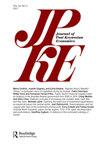论凯恩斯的概率和不确定性
IF 1
3区 经济学
Q4 ECONOMICS
引用次数: 1
摘要
近年来,人们对凯恩斯的概率和不确定性概念产生了很大的困惑。凯恩斯认为,概率(他的逻辑概率)是生活的向导,也就是说,它有一些理由去相信和行动。因此,概率论是一种关于合理的部分信念的理论,是一种非论证推理的逻辑,在有限知识的条件下,决策和行动都建立在它的基础上。对凯恩斯来说,(他的)概率是生活中积极的、建设性的和前瞻性的因素。有限的知识不是决定和行动的障碍。根据他的说法,他的概率在生活中几乎所有的普通情况下都能帮助我们。这就是为什么凯恩斯认为无知和不确定性是生活中尤其是经济学中最难解决的两个问题的主要原因。两者都与缺乏有限的知识有关。无知是缺乏已知的理由;凯恩斯写道,我们不知道。凯恩斯的不确定性是一个比无知更有趣的概念。不确定性是由多种原因造成的,其中之一是概率的内在不可通约性。因此,不确定性与凯恩斯的计量哲学有关,这一哲学也渗透在他的复杂经济学中。本文章由计算机程序翻译,如有差异,请以英文原文为准。
On Keynes’s probability and uncertainty
Abstract There has been great confusion on Keynes’s notions of probability and uncertainty in recent years. Keynes believes that probability (his logical probability) is the guide of life, i.e., it is having some reasons to believe and to act. So probability is a theory of reasonable partial belief and a logic of non-demonstrative reasoning, upon which decision and action in conditions of limited knowledge, are based. (His) probability is, for Keynes, a positive, constructive, and forward-looking element of life. Limited knowledge is not a bar to decision and action. According to him, (his) probability helps us in almost all ordinary situations of life. This is the main reason why Keynes believes that ignorance and uncertainty are the two most difficult issues to tackle in life and in economics in particular. Both are related to a lack of limited knowledge. Ignorance is a lack of known reasons; Keynes writes we do not know. Keynes’s uncertainty is a much more intriguing concept than mere ignorance. Uncertainty is due to various reasons, one of them is the intrinsic incommensurability of probabilities. So, uncertainty is related to Keynes’s philosophy of measurement, a philosophy that also pervades his complex economics.
求助全文
通过发布文献求助,成功后即可免费获取论文全文。
去求助
来源期刊

Journal of Post Keynesian Economics
ECONOMICS-
CiteScore
1.70
自引率
10.00%
发文量
23
期刊介绍:
The Journal of Post Keynesian Economics is a scholarly journal of innovative theoretical and empirical work that sheds fresh light on contemporary economic problems. It is committed to the principle that cumulative development of economic theory is only possible when the theory is continuously subjected to scrutiny in terms of its ability both to explain the real world and to provide a reliable guide to public policy.
 求助内容:
求助内容: 应助结果提醒方式:
应助结果提醒方式:


